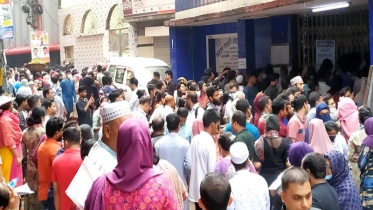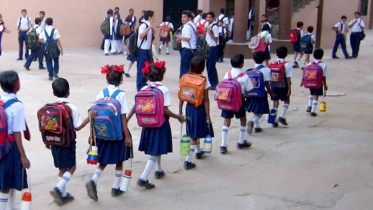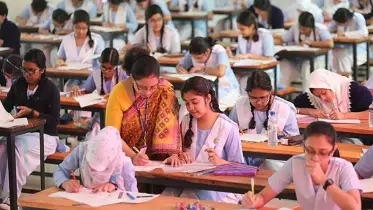বি. এ. (সম্মান) এম. এ. (ইংরেজি)
উপাধ্যক্ষ, কুইন্স কলেজ, ঢাকা
পরীক্ষক, ঢাকা বোর্ড ও NTRCA
[email protected]
প্রিয় শিক্ষার্থী বন্ধুগণ, গত সংখ্যায় আমরা ইংরেজি দ্বিতীয় পত্রের Gap filling with prepositions (without clues) –এর কিছু গুরুত্বপূর্ণ নিয়ম আলোচনা করেছি। আজ আমরা গুরুত্বপূর্ণ কিছু উদাহরণ নিয়ে আলোচনা করব। পরীক্ষায় ১০টি শূন্যস্থানসহ একটি অনুচ্ছেদ দেওয়া থাকবে। তোমরা শূন্যস্থানগুলোতে সঠিক preposition ব্যবহার করবে।
1. Emperor Shah Jahan (a) — Delhi built Taj Mahal. It is a tomb (b) — his wife in Agra. The building is made (c) — fine white marble. It rests (d) — a platform. Four white towers rise (e) — the corners of the terrace. There is a large dome (f) — the centre. There is an open corridor (g) — which visitors can look (h) — carved marble screens (i) — a central room. The Taj Mahal is surrounded (j) — a beautiful garden. There is a long pool in front of the building.
2. Bayazid's mother was sleeping (a) — her bed. He was reading sitting (b) — her bed. Suddenly she woke (c) —. She told him to give her a glass (d) — water. He stood (e) — from his seat. He went to the jar to fetch water. But there was no water in the jar. The whole locality was (f) — deep sleep. He went (g) — of the house and looked (h) — water but in vain. He remembered the fountain. The fountain was at the other side of the locality. He made (i) — his mind to go there. He went to the fountain with the jar. He filled the jar (j) — water and returned home. But he found his mother lost in deep sleep.
3. A pious man is absorbed (a) — meditation. He has firm faith (b) — the Almighty. He abides (c) — the rules (d) — religion. He is also very simple (e) — his ways of life. He clings (f) — his faith. He knows that man is accountable (g) — the Almighty (h) — his action. So, he leads his life according (i) — religion. He is not angry (j) — anybody.
4. We started for the station early in the morning. We got (a) — the train and luckily I got my seat (b) — a window. The train began to move smoothly. I looked (c) — the window. It seemed that everything was running behind. Now and then the train crossed a bridge (d) — a river (e) — chattering noise. I was really charmed (f) — the beauty in either side of the line. (g) — an eight-hour journey at last our train reached Rajshahi railway station at (h) — 1 pm. We got (i) — from the train and went to my sister's house (j) — a taxi cab.
5. Bertrand Russel was an outstanding philosopher and perhaps the greatest thinker (a) — the contemporary time. He was born (b) — 1872 (c) — an aristocratic family. He was privately educated and he acquired a perfect knowledge (d) — French and German. (e) — 1890, he went (f) — Trinity College, Cambridge where he graduated (g) — distinction. He was appointed a fellow of his college (h) — the autumn (i) — 1895. (j) — 1895 to the outbreak of the World War he led a simple life.
6. The low income people (a) — Bangladesh are severely affected (b) — blockade and hartal because most autorickshaws and tempos do not operate (c) — hartal/blockade days. Almost all earnings (d) — drivers and helpers are forgone. Some vehicles operate (e) — same personal risk (f) — drivers and helpers but earnings are considerably lower than normal. (g) — continuous hartal/blockade the garment factories were more likely (h) — close down (i) — which casual workers were retrenched and not paid. Small entrepreneurs like hawkers and vendors are badly affected (j) — hartal and political unrest.
7. A fountain pen is an instrument which is used (a) — writing purpose. Nowadays a fountain pen is an essential article (b) — the educated men of all ages. It has two parts-the main body and the cap. The main body holds the nib. It is ages. It is hollow inside and holds ink (c) — its hollow body. Again there is a rubber tube (d) — the hollow bodies of some fountain pens. This rubber tube contains ink. The cap has a clip attached (e) — its end, it protects the nib (f) — being damaged. The cap is screwed (g) — the main body. It is with the help (h) — the clip that one holds a fountain pen (i) — the edge of his pocket. The fountain pens are (j) — different colors, shapes and sizes.
Gevi †Zvgvi Dˇii m‡½ wb‡Pi DËi¸‡jv wgwj‡q bvI|
1. (a) of; (b) for/of; (c) of; (d) on; (e) from; (f) at; (g) from; (h) through; (i) into; (j) by
2. (a) on; (b) by; (c) up; (d) of; (e) up, (f) in; (g) out; (h) for; (i) up; (j) with.
3. (a) in; (b) in; (c) by; (d) of; (e) in; (f) to, (g) to, (h) for; (i) to; (j) with
4. (a) into; (b) beside; (c) outside; (d) over; (e) with; (f) by; (g) After; (h) about; (i) down; (j) by
5. (a) of; (b) in; (c) in; (d) in/of; (e) In; (f) to; (g) with; (h) in; (i) of; (j) From
6. (a) of; (b) by; (c) in; (d) of; (e) at; (f) by; (g) During, (h) to; (i) for; (j) by
7. (a) for; (b) for; (c) in; (d) in; (e) to, (f) from; (g) to, (h) of: (i) at; (j) of
আরো পড়ুন
শীর্ষ সংবাদ:








